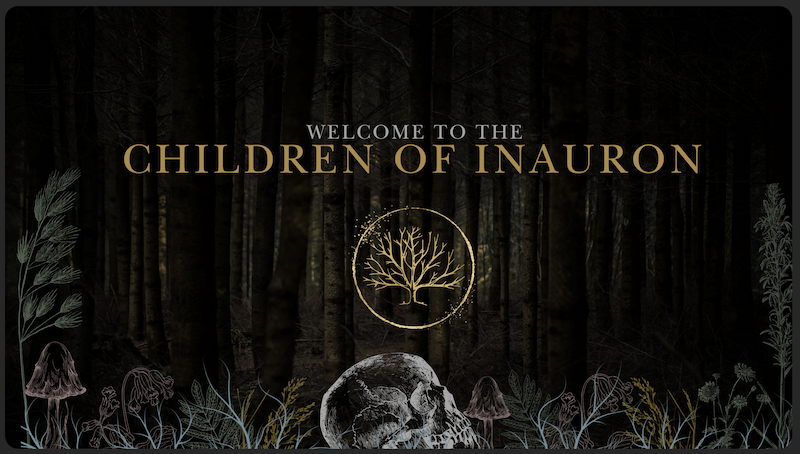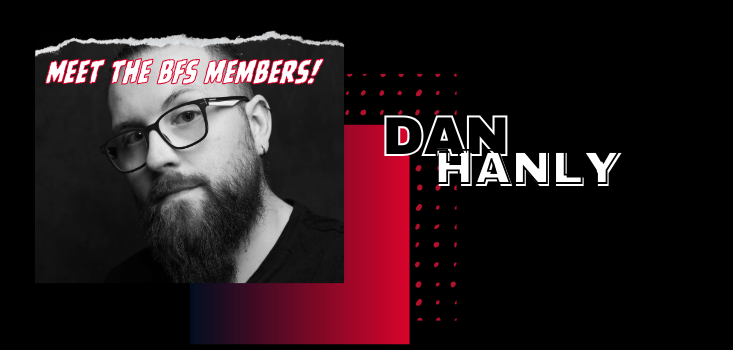Every Friday, we meet a member of the BFS and peer deep into their soul (or, at least, a form they filled out). Want to be featured? Email us: online@britishfantasysociety.org
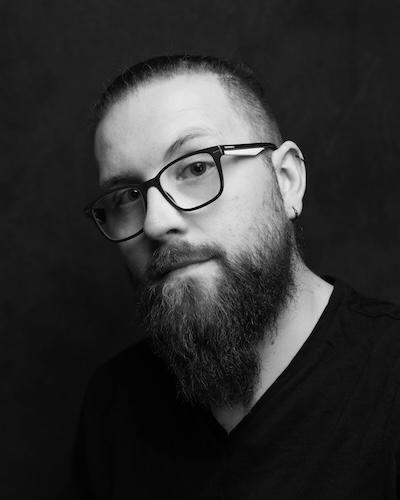
Name:Â
Dan Hanly (he/him)
Which region are you based in?Â
South Wales
If you write, which genre?
Fantasy and Horror
Are you drawn to any specific SFFH sub-genres?Â
I like to straddle the line between fantasy and horror, so dark fantasy, psychological horror, and any permutations around that area.
Your influences
Tell us about the book/film/thing that got you into SFFH: What was it? How old were you? What impact did it have on you?
When I was a child, I read Redwall by Brian Jacques. It was like a starter-pack for all the epic fantasy tropes – the chosen one, coming-of-age, a clear-cut line between good and evil – and it was great. Having dipped my toes into fantasy with Redwall, nobody could have possibly guessed how utterly enraptured I was by the video game Baldur’s Gate 2: Shadows of Amn. I played it to death, and that only solidified how much I loved fantasy settings. Also, as I grew older, I read a lot of Stephen King and Dean Koontz, particularly when I was attempting to be an edgy teenager.
How does that early influence show up in your work (writing/agenting/publishing/editing/art/reading/etc) now?
I love becoming part of a fantasy world with massive amounts of history and distinct cultures, which is part of the reason I loved Redwall and Baldur’s Gate 2 so much. So, it was almost a natural progression for me to experience the process of worldbuilding for myself. For the benefit of my debut novel, The Great Leap (pictured), I’ve written a sort-of Almanac of the history of the world, right from the creation story up to the present day covering important events across thousands of years. Then, within The Great Leap, I give the reader a tiny window with which to experience that world. My hope is that with the sequels, I can widen the window, and let in a bit more of this world’s extensive history.
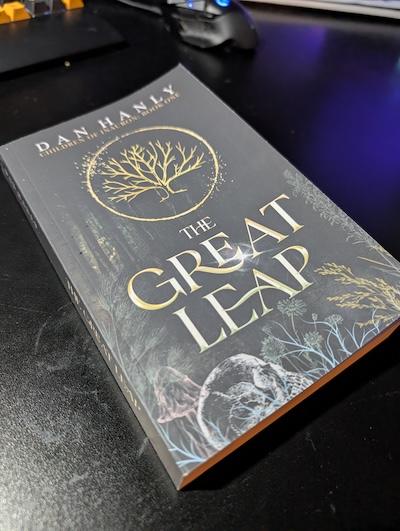
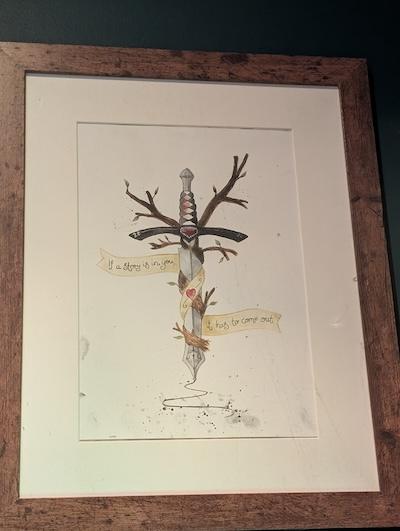
Where do you draw your creative inspiration from?
I’m fascinated with the medieval fantasy settings, and so I draw a lot of my inspiration from Celtic and British medieval history. I love the extensive storied history of Britain, which has been occupied by a multitude of different cultures across the years. I’m particularly fascinated with old tribal/druidic vibes, and the connection with the natural world that those cultures are purported to have had. Of course, I’d be remiss not to credit authors such as Brandon Sanderson and Stephen King as being massive creative inspirations with their work too.
(The pictured art is by Dan’s wife, and he finds it inspirational)
Who do you look to as a genre hero? Why?
For me, Brandon Sanderson (pictured below) is one of my favourite authors, and probably most fits the bill of being a genre hero.
He’s been able to communicate an incredibly complex universe of stories using his accessible, contemporary-sounding prose in a way that means I can share many of his stories with my wife. I tend to appreciate stories that are dense and complex, whilst my wife enjoys stories that are action-packed and well-paced with simple prose. For me, Brandon Sanderson is one of the few authors that sits within the limited Venn Diagram overlap between us. If someone can write in such a way to appeal to such a wide range of readers, that means they’re able to get more and more readers involved in Fantasy reading as a whole – I can only aspire to be that accessible.
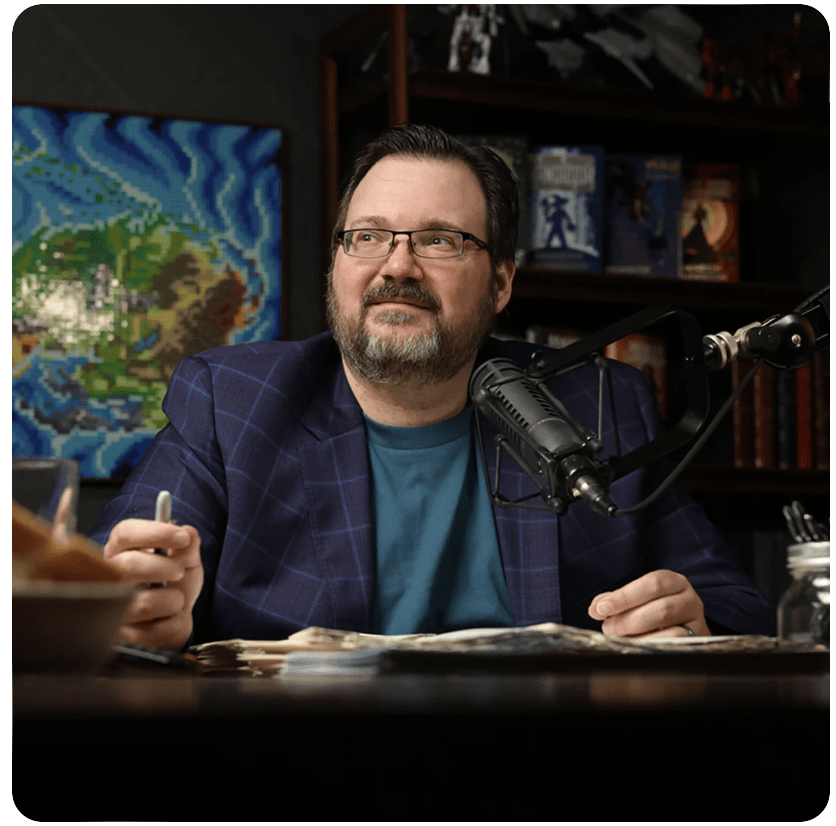
Your work
You’re stuck in an elevator for 60 seconds with that hero, and they want you to describe your work. Give us the pitch.
Oh My God, Hi, you’re Brandysandy. (Do you mind if I call you that? No? Great!) So, I’ve written a story that you may be interested in reading. It’s called The Great Leap, and it’s a story that – like many of yours – is grounded in the human experience. The plot follows a group of teenagers that are banished from their village for a crime they didn’t commit into a dark and unforgiving primaeval forest. It focuses heavily on the struggles for survival that these teens go through as they battle each other, their demons, and whatever seems to be stalking them through the trees. It doesn’t shy away from mature topics, but it’s intended to depict teenagers as they are in reality – with their traumas, struggles and immaturities on display.
What are you working on right now?
I’ve got two projects in the works – first, I’m around 75% complete on the sequel to The Great Leap, which focuses on one of the other teenagers from this group of exiles. This one is shaping up to be darker, and leaning more towards the horror side of dark fantasy. It has a particular focus on mental health, and deals with a character’s guilt and shame as they struggle to survive in this inhospitable forest.
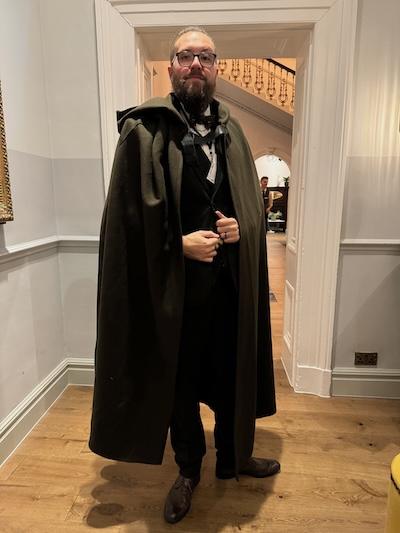
And secondly, I’m also working on another story that’s more of a traditional epic fantasy, following a number of different people in different places across three nations as the countries work together (or against each other) to figure out what happened in a city near each of their borders. When every single soul in a city close to three country borders is snuffed out and nobody knows how or why, then it becomes everyone’s business to figure it out – because, without answers, the same could happen to them.
(Pictured: Dapper Dan at Fantasycon in Chester, 2024)
Thinking about all the stories/work you’ve done, what sticks out most in your mind? Why?
For better or worse, my stories all tend to be focused around mental health, and the struggles that many people have. Fleta in The Great Leap is attempting to assert her own identity after a traumatic childhood, and her twin Bronson is without his ability to self-medicate from his own woes. These are troubled teenagers, and my stories give you a peek into their minds and depict their recovery or decline. Lawson, in the unreleased Book 2, is dealing with his guilt and shame. It seems that no matter where I start in a story, I always seem to bring it back to mental health in some way. I’m certain that this is a subconscious attempt to normalise depictions and struggles with mental health, to remove the ‘tabooness’ of the topic – because if more people felt comfortable sharing their struggles, then more people would feel empowered to get the help they need.
Where and when do you create/are you at your most creative?
Truly, anywhere. I’ve made certain that I use tools and software that I can access wherever I am. If I’m constrained by my home office desktop (pictured), then what happens when inspiration strikes when out of the house, or in bed, or even on the bog? I sometimes feel like I’m not in control of how and when inspiration strikes, so I need to always be prepared. I use Obsidian to write mostly; it’s an open-source software that works on mobile, offline, online, on my desktop, my work laptop, my tablet, with a function to synchronise across the platforms. That way I can ensure I’m always able to just start writing wherever I am.
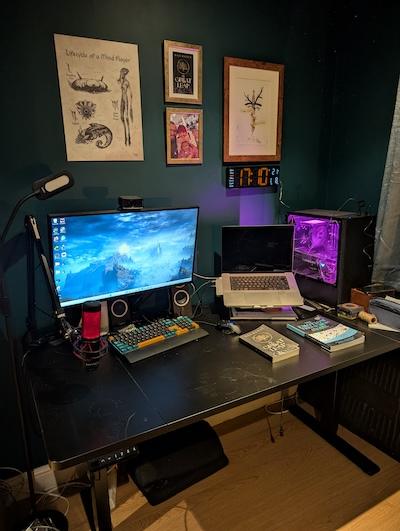
What’s the best advice you’ve received about creativity?
“Just do itâ€. It’s the simplest advice, but the most effective. If you want to be creative, just do it. Don’t worry about how you’re perceived, or if you’re doing it the ‘right way’ – just do it. I went through this myself. I’m a perfectionist at heart, and because of that, I sometimes get weighed down by my need for everything to be perfect. I wrote The Great Leap to around 80% and stopped for about a year because I was getting stressed about how it wasn’t perfect. I needed to just do it, just get it done. Don’t worry about the structure, the editing, the inconsistencies – all of that can be dealt with at a later date. Perfection is the enemy of ‘done’.
What’s your writing soundtrack?
I have ADHD, so any sort of distraction kicks me out of my flow. You might think I therefore need silence, but you’d be wrong. See if my chair squeaks, or I can hear my daughters watching the TV in the next room, I’m out of it; my flow ruined. So my writing soundtrack needs to be loud – to drown out the distractions, to give me a baseline of environmental noise. Repeats of some of my favourite metal albums used to work wonders – I knew the songs so well, they were easy to ‘tune out’ and focus.

However, now I use Brain.fm, which is a software that plays specialised music with a high neural effect designed for focus. I’m not sure whether it’s real science, pseudoscience, or the placebo effect, but I do find it helps me focus when I’m trying to write.
The Quick-Fire Round
Sci-fi, fantasy or horror?
Fantasy
Quiet or loud?
Ooo, quiet please. Unless I’m the one making the noise, in which case, I’m pretty loud.
Dark or light?
Dark. Gimme that dark mode on my phone, low ambient lights, chill winter evening vibes.
Strict lines or genre blend?
Genre blend. Though not intentionally – sometimes I just follow the story where it needs to go and sometimes where it needs to go is up and over the strict lines into another genre.
Awards or bestseller?
Bestseller – even if it’s a free book. I just want lots of people to experience my work, to be honest.Â
Fiction or non-fiction?
Fiction. I use fiction to hide from non-fiction.
Poetry or prose?
Prose
Plotter or pantser?
I’m a hybrid. I do a rough plot, but I leave myself room to break that plot as I’m writing.
Reading or listening?
Depending on what I’m doing with my hands! If I’m driving, then listening; if I’m not, then reading.Â
Notebook or computer?
Computer – although mainly for my massive collection of Steam Games.
Favourite SFFH book of all time?
Can’t do books – how about series? Either The Dark Tower series, or The Stormlight Archive.
Last book you read?
The Shadow of What Was Lost by James Islington.
Any SFFH author on auto-buy?
Basically anyone I’ve read and enjoyed before – I enjoy collecting books. (Evidence in photo: Dan’s bookshelf)
Favourite podcast?
For writers it’s got to be The Tiny Bookcase, but in general either the various podcasts by Smosh, or true-crime ones like Casefile.
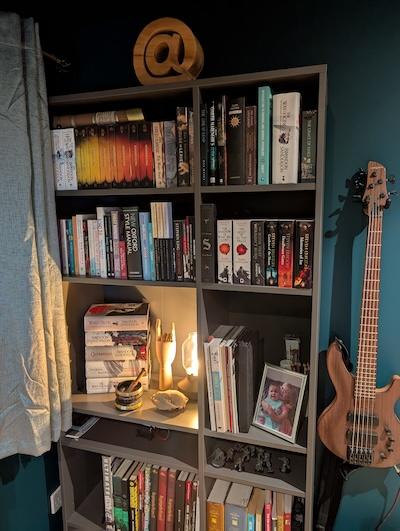
The Home Stretch
What’s the best thing about being part of the SFFH community?
The connections. It’s a great, supportive community, and being on the inside of it feels cosy and warm, like a fluffy blanket. I feel like I have people I can bounce ideas off of, people whose expertise I can tap into, people whose book recommendations come thick and fast. It’s great to be here to absorb all of that, and I hope I can share my own experiences and recommendations back in too. Also, great memes!
Time to plug your stuff! Where can we find you and your work? What have you got coming up? Consider this your advertising space.
My debut novel The Great Leap is the first in a series of books called the Children of Inauron. The Great Leap is available on Amazon as an ebook, in both hardback and paperback. And now, most recently, it’s been released as an audiobook, narrated by a wonderful Welsh narrator called Clare Butterfield-Elsey.
If you would like to follow me, you can find me on TikTok @danhanly, YouTube @DanHanly, Bluesky @danhanly.com, Instagram @danhanly and Facebook @dhanly – and of course, my website danhanly.com
